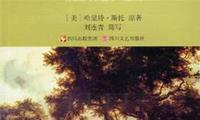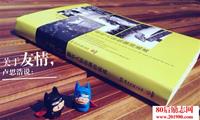莫泊桑項鍊英文讀後感
The Necklace: Reflections and Confessions of Human’s Vanity
“What would have happened if she hadn’t lost that necklace? Who knows? Who knows? How strange and changeful is life! How small a thing is needed to make or ruin us!” This is what impressed me most in “The Necklace” written by Guy de Maupassant. I love the story not only due to the incredibly wonderful ending, but also because of the exquisite description of the weakness of humanity.
In his story, Guy de Maupassant creatively reveals Mathilde Loisel's dreams of a wealthy, splendid lifestyle. Mathilde's lifetime of misery and despair is solely caused by her own selfish acts. And her vain obsession all ended up ruining her life.
Vanity is defined as excessive pride, especially in your appearance. In Mathilde's case, the "excessive pride" in her looks and charm caused her to feel as if she deserved a higher ranking social class and the wealth. When she wore the necklace to the party, she wanted to give the illusion that she was something that she was not. Vanity caused Mathilde to fantasize about her life and surroundings-to live in a world of illusion, rather than reality.
Her life was affected in a negative way because of her obsession with vanity. It is so sad that she honestly felt successful the night of the dinner, just because of her looks and her surroundings. What a distorted view of true happiness and fulfillment! NEither an elegant dress or a beautiful piece of jewelry can make a person who they are. A caring and loving person has to be unselfish. Mathilde Loisel definitely lacked a caring and loving personality. The only person she proved to love was the person she wanted to be. Had Mathilde not spent so much of her life selfishly, she and Mr. Loisel could have had a lifetime of happiness. The most ironic and interesting piece of the story is the conclusion. Their lives were ruined for no reason. Had she told Mrs. Forrestier the truth about the lost necklace, she would have known that the necklace was just costume jewelry. Actually, it’s a tragedy made by herself, for she was conquered by the evil of her heart.
In pursuit of vanity may lead to the loss of ourselves. Accept who we are and to be to true to ourselves or else it will contribute to constant unhappiness. Happiness or misfortune, it all depends.
項鍊讀後感100字(一)
近期我讀了短篇小說之王莫泊桑寫的《項鍊》,是我感慨萬千。
文章寫了一個愛慕虛榮的女人由於買不起名貴的項鍊,就借,結果在舞會上弄丟了,又買了一個真項鍊還給了朋友,從此身背債款,在錢要還完的時候,再次碰見當年的朋友,朋友告訴他項鍊是假的時候,這女人。可想而知,這正是上天對她的懲罰。
我們在日常生活中,不要愛慕虛榮,斤斤計較,自然美才是真的美,心靈美比一切更重要。我們只需做回我們自己,最真實的自己。
項鍊讀後感100字(二)
雖然瑪蒂爾德是不幸的,
看完這篇小說更讓我覺得:生活不是雲裡霧裡的幻想,更多的是腳踏實地的一步步走過。
項鍊讀後感100字(三)
虛榮心很難說是一種惡行,然而一切惡行都圍繞虛榮心而生,都不過是滿足虛榮心的手段。()虛假的榮譽是一個轉瞬即破的肥皂泡,我們不應該追求這種並不屬於自已的虛假的東西;而要腳踏實地地去幹一番事業,通過奮鬥,創造出屬於自己的榮譽來。
項鍊讀後感100字(四)
讀了項鍊這篇文章之後,我不僅對文章的文采有了進一步的認識,深一步的體會,縱觀世界名著,數之可數,但真正有譜的,
與同類的小說相比,莫伯桑巧妙的運用人物旁白和歷史的背影相結合,這也是我感觸最大的,要想寫好文章,恐怕莫非如此了。
項鍊讀後感100字(五)
小說發人深省之處是讓我們目睹了污濁,虛假,拜金的社會中的一顆金子般的心,一朵出淤泥而不染的蓮花。瑪蒂爾德是不幸的,她不幸在於不能盼自己得不到的東西而白白地增加煩惱,同時她是幸運的人,殘酷的現實讓她清醒,生活不只是雲裡霧裡的幻想,更多是腳踏實地一步步的走過。
項鍊英文讀後感
Guy de Maupassant was the child of an unhappy marriage. His mother has been dessccrriibbeedd as neurotic and his father as a man who sought relief from his wife in the arms of other women. Perhaps the collapse of his parents' marriage engendered de Maupassant's pessimism, reflected particularly in his stories about infidelity and failed relationships. It certainly influenced his own attitude toward women, which, in turn, affected his creation of characters in stories such as "The Necklace."
Events in History at the Time of the short story
The purpose of women. De Maupassant's attitude toward women was ambivalent. He was one of few nineteenth-century authors to recognize and celebrate women's sensuality rather than regard it as a sign of corruption. He was also, however, devastatingly cruel to women, whether in his own life or in his fiction. He recommended that the French Academy commission a treatise on how to "break decently, properly, politely, without noise, scene or violence, with a woman who adores you and with whom you are fed up" (de Maupassant in Steegmuller, p. 178)。 He scoffed at monogamy, insisting that he could not understand how two women could not be better than one, three better than two, and ten better than three.







